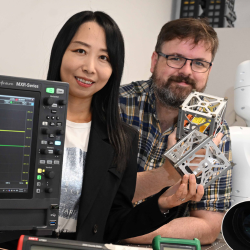-
Study
-
Undergraduate
- Search for a Course
- Undergraduate Open Day & Events
- Application Guides
- Northumbria University UCAS Exhibitions
- Foundation Years
- Undergraduate Fees & Funding
- School & College Outreach
- Continuing Professional Development
-
Postgraduate
- Postgraduate Study Degree
- Postgraduate Research Degrees
- Postgraduate Open Days and Events
- Postgraduate Fees & Funding
- Flexible Learning
- Thinking about a Masters?
- Continuing Professional Development
- Change Direction
-
Student Life
- The Hub - Student Blog
- Accommodation
- Life in Newcastle
- Support for Students
- Careers
- Information for Parents
- Students' Union
- Northumbria Sport
- Be Part of It
-
-
International
International
Northumbria’s global footprint touches every continent across the world, through our global partnerships across 17 institutions in 10 countries, to our 277,000 strong alumni community and 150 recruitment partners – we prepare our students for the challenges of tomorrow. Discover more about how to join Northumbria’s global family or our partnerships.
View our Global Footprint-
Applying to Northumbria
- European Union
- Our London Campus
- Northumbria Pathway
- International Events
- Entry Requirements and Country Representatives
- Regional Offices
-
Northumbria Language Centre
- Faculty Requirements
- Acceptable English Requirements
- Pre-sessional English Language and Study Skills
- Academic Language Skills Programmes (ALS)
-
International Fees, Funding & Scholarships
- International Undergraduate Fees
- International Undergraduate Funding
- International Masters Fees
- International Masters Funding
- International Postgraduate Research Fees
- International Postgraduate Research Funding
- International Money Matters
-
Life at Northumbria
- International student support
- Careers
-
International Mobility
- Current Northumbria Students
- Incoming Exchange Students
-
-
Business
Business
The world is changing faster than ever before. The future is there to be won by organisations who find ways to turn today's possibilities into tomorrows competitive edge. In a connected world, collaboration can be the key to success.
More on our Business Services -
Research
Research
Northumbria is a research-rich, business-focused, professional university with a global reputation for academic quality. We conduct ground-breaking research that is responsive to the science & technology, health & well being, economic and social and arts & cultural needs for the communities
Discover more about our Research -
About Us
-
About Northumbria
- Our Strategy
- Our Staff
- Place and Partnerships
- Student Profiles
- Alumni Profiles
- Leadership & Governance
- Academic Departments
- University Services
- History of Northumbria
- Contact us
- Online Shop
-
-
Alumni
Alumni
Northumbria University is renowned for the calibre of its business-ready graduates. Our alumni network has over 244,000 graduates based in 178 countries worldwide in a range of sectors, our alumni are making a real impact on the world.
Our Alumni - Work For Us
What will I learn on this module?
This module functions as a “capstone” to your Batchelor studies. The module gives you the opportunity to work in a team to build a computing product directly related to your programme of study. This develops and demonstrates your skills in leadership, team work, project management, planning, communication (both written and oral) as well as technical skills in the technology you choose to implement in. This module aims to give you further experience of team working in the specialism you have selected which is an invaluable asset and highly prized by employers. The project and its potential future commercial exploitation provide a context for you to critically evaluate your and your team’s performance, the fitness for purpose of the product you have developed and the legal, ethical, professional and social content of your chosen specialism. Appropriate Information Security factors will be considered as part of this evaluation. As part of this learning journey you will also explore the associated commercial and economic factors.
You will have the opportunity to apply a wide range of development skills (in specification, design and implementation) to your product development. All products will consider all aspects of the development life cycle. Some projects may be driven by research activity in the department’s research groups, some by the expectations of a “client” and some by students’ own interests. A “client” is a non-fictitious potential benefactor of the project for example a student’s employer, former placement provider, local charity etc. who are willing to formally consent to be involved in the project.
Wider Legal, Ethical, Social and Professional implications will be examined to enable you to appreciate the responsibilities involved in the development and use of computer products both in work and throughout society.
How will I learn on this module?
With the guidance of an academic supervisor, your team will be responsible for managing, scoping, designing, implementing and documenting an appropriate software solution, building on skills learned in other modules. You will apply project management skills and techniques to ensure your team can complete the work on schedule and you will consider relevant professional, legal, social and ethical issues in the development of the product. Additionally you will enhance your communication, leadership and negotiation skills through the completion of this project.
Following a demonstration of your product you will critically evaluate the product, project, and wider Legal, Ethical, Social and Professional implications related to the potential commercial exploitation of the product. This will provide you with the opportunity to demonstrate constructive criticality.
How will I be supported academically on this module?
This module will combine a range of methods to support your learning. There will be lectures to guide you through the key module requirements. You will meet your tutors on a regular basis, giving advice and feedback throughout. Additional technical support sessions are available in some weeks to assist you in the development of your application if required. Your group will be encouraged to take control over your project and to work independently of the tutors much of the time to achieve the project you have designed – this helps you to learn from each other, as well, as your tutors, as you help and support each other to complete the project.
As well as during the scheduled lectures, tutors will be available during the timetabled classes to offer help and advice as well as to provide feedback on work completed on a weekly basis.
What will I be expected to read on this module?
All modules at Northumbria include a range of reading materials that students are expected to engage with. Online reading lists (provided after enrolment) give you access to your reading material for your modules. The Library works in partnership with your module tutors to ensure you have access to the material that you need.
What will I be expected to achieve?
Knowledge & Understanding:
1. Plan appropriate requirements, design and implementation strategies and methods for the development of a significant computing product related to your programme of study (including consideration of commercial, economic, legal, ethical, social and professional factors)
2. Critically apply a well-integrated requirements, design and development methodology to a computing problem
Intellectual / Professional skills & abilities:
3. Develop a significant computing product using industrial standard development tools and techniques (including those related to information security) including the application of the required project management and team working skills
4. Apply appropriate quality assurance techniques and work to appropriate professional standards for documentation, quality control and product integrity
Personal Values Attributes (Global / Cultural awareness, Ethics, Curiosity) (PVA):
5. Critically evaluate project work in terms of the technical decision making, group work, processes and responsibilities, the final project deliverables as well as the professionalism, ethical and legal considerations and potential social impacts (including information security).
How will I be assessed?
The summative assessment will consist of two assessments
The first assessment will require you to submit a log of your development process, together with a video presentation of the product that your team has implemented. This will be worth 60% of the marks available and will assess MLOs 1,2,3,4. You will receive verbal and written feedback on your work.
For the second assessment you will write an evaluation where you will consider the project you have completed, identifying areas of strengths, weaknesses and learning. You will reflect on the product you have constructed and the process of the completion of the project from its inception to completion, considering relevant legal, social, ethical and professional issues. Your will explore these both in terms of the project and in terms of the potential wider commercial adoption of the product. This will be worth 40% of the marks available and will assess MLO 5. You will receive written feedback on your work.
Formative assessment and feedback - you will work on the system in timetabled sessions and will be provided with feedback on your work.
Pre-requisite(s)
N/A
Co-requisite(s)
N/A
Module abstract
This module gives you the opportunity to work in a team to build a computing product which develops and demonstrates your skills in leadership, team work, project management, planning, communication (both written and oral) as well as technical skills in the technology you choose to implement in. This module aims to give you a ‘real-world’ experience of team working which is an invaluable asset and highly prized by employers. The project and its potential future commercial exploitation provide a context for you to critically evaluate your and your team’s performance, the fitness for purpose of the product you have developed and the legal, ethical, professional and social content of your chosen specialism. These are attributes that will help you in a career in computing.
Course info
UCAS Code G404
Credits 20
Level of Study Undergraduate
Mode of Study 3 years Full Time or 4 years with a placement (sandwich)/study abroad
Department Computer and Information Sciences
Location City Campus, Northumbria University
City Newcastle
All information is accurate at the time of sharing.
Full time Courses are primarily delivered via on-campus face to face learning but could include elements of online learning. Most courses run as planned and as promoted on our website and via our marketing materials, but if there are any substantial changes (as determined by the Competition and Markets Authority) to a course or there is the potential that course may be withdrawn, we will notify all affected applicants as soon as possible with advice and guidance regarding their options. It is also important to be aware that optional modules listed on course pages may be subject to change depending on uptake numbers each year.
Contact time is subject to increase or decrease in line with possible restrictions imposed by the government or the University in the interest of maintaining the health and safety and wellbeing of students, staff, and visitors if this is deemed necessary in future.
Useful Links
Find out about our distinctive approach at
www.northumbria.ac.uk/exp
Admissions Terms and Conditions
northumbria.ac.uk/terms
Fees and Funding
northumbria.ac.uk/fees
Admissions Policy
northumbria.ac.uk/adpolicy
Admissions Complaints Policy
northumbria.ac.uk/complaints














